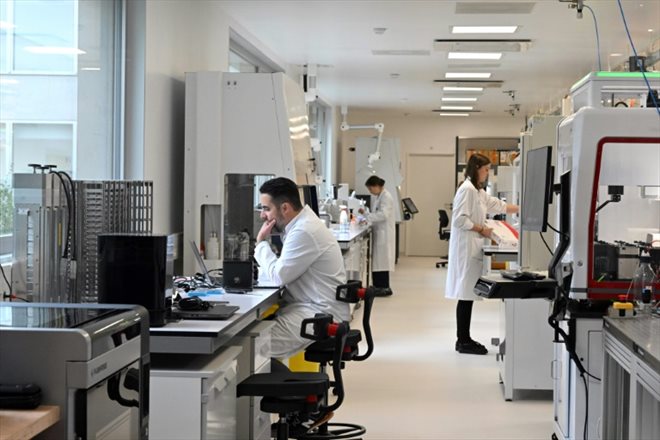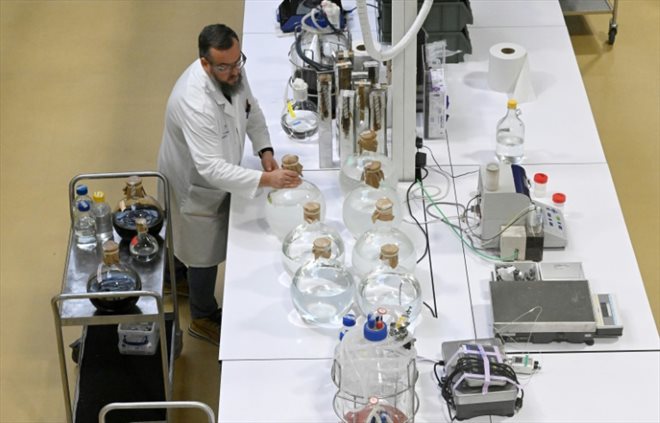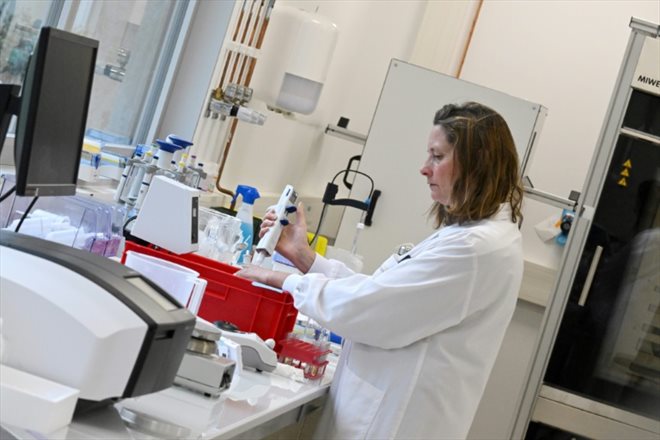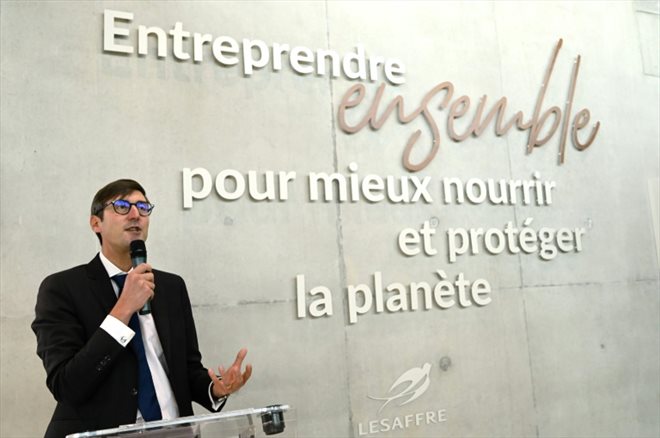Employees of Lesaffre, a global fermentation giant, at the group’s new campus inaugurated in Marc-en-Baroeul, near Lille, on October 13, 2022 in the North (AFP / FRANCOIS LO PRESTI)
It makes bread rise, is essential for beer, but can also strengthen immune defenses or produce clean resins: the invisible yeast has found a setting to match on the campus of the Lesaffre group, near Lille.
The global fermentation giant inaugurated on Thursday a 19-hectare park dedicated to research and innovation: “a historic step in the development of the family group” born in the North and present today in 78 countries, for its general manager Brice-Audren Riché.
Lesaffre, which employs 11,000 people for a turnover of 2.2 billion euros, is betting on “the infinitely small” to “better feed and protect” a planet which will have 9 billion people in 2050.

Employees of Lesaffre, a global fermentation giant, at the group’s new campus inaugurated in Marc-en-Baroeul, near Lille, on October 13, 2022 in the North (AFP / FRANCOIS LO PRESTI)
“Micro-organisms (yeasts, bacteria) are part of the solution”: Lesaffre, which has been working with its yeasts for 170 years, always marvels at the “infinite potential of fermentation”.
This natural biochemical process consists of the transformation of a raw food by the action of enzymes produced by micro-organisms. Yeast, a single-celled fungus, makes bread rise by transforming cereal glucose into carbon dioxide since antiquity: the Egyptians ate bread.
– “The largest bio-foundry in Europe” –
Lesaffre “masters this process at the industrial level” for nearly two centuries but wants to innovate more, and faster.

An employee of Lesaffre, a global fermentation giant, at the group’s new campus inaugurated in Marc-en-Baroeul, near Lille, on October 13, 2022 in the North (AFP / FRANCOIS LO PRESTI)
The campus brings together all the teams present in the region: 700 people, including 500 researchers and developers, have access to state-of-the-art laboratories and industrial pilots.
The buildings, 23,000 m2 on one level, are organized around a vast interior alley – the offices on the left, the laboratories on the right – punctuated by collective spaces. Around, a garden bordered by a canal where swans glide.
Everything is there: the strain library, the experimentation benches, the test tanks, the finished products: drinks or breads of which hundreds of recipes are tested in the bakeries of the +baking center+ before marketing.
Microbiologist Hassina Aït-Abderrahim, at the head of a team that enriches, classifies and maintains Lesaffre’s “living library” – 18,000 micro-organisms – sees only advantages in it.
“Being all in the same place”, she explains, “allows important informal exchanges: we talk about recipes between scientists, we also share spaces and equipment. And we can immediately see the fruit of our research, for example by testing at the + baking center + diacetyl, which gives a buttery taste to food”.

An employee of Lesaffre, a global fermentation giant, at the group’s new campus inaugurated in Marc-en-Baroeul, near Lille, on October 13, 2022 in the North (AFP / FRANCOIS LO PRESTI)
The heart of this new site is the “biofoundry”, “the largest in Europe”, which promises to increase the group’s striking power tenfold: dozens of machines make it possible to simultaneously carry out hundreds of manipulations intended to classify micro- organisms according to their fermentative, gustatory and nutritional qualities in humans, animals or plants.
“We have gone from 10,000 tests per month to 10,000 tests per day. Eventually, we are aiming for 100,000”, explains Christine M’Rini Puel, director of Research and Development at Lesaffre.
– From vanillin to ethanol –
The group will not say what this “major competitive asset” cost it, its managing director confining himself to confirming that the nutrition/health/biotechnology sector is growing rapidly and today represents around a third of Lesaffre’s activities, two other thirds remaining devoted to the historic activity of “baking”.

The CEO of Lesaffre, Brice-Audren Riché, during the inauguration of the group’s new campus on October 13, 2022 in Marcq-en-Baroeul, in the North (AFP / FRANCOIS LO PRESTI)
“We have only explored a tiny part of the field of possibilities,” says Brice-Audren Riché, listing a string of innovations.
Some have become great classics in the kitchen, such as vanillin, which Lesaffre has been marketing for 15 years: “it is a natural substitute for pods from Madagascar obtained by fermentation of the husk of the rice, under the effect of a bacterium “, he says.
Less known to the general public, the yeasts at work in the manufacture of bioethanol (from cellulose), resins (for tires), or in the development of foods that are easier for animals to digest, which will, in the long term, give cows a smaller portion because it is better assimilated, and even perhaps less belching.
Lesaffre will open a new factory in Denain (North) in 2023 to produce chondroitin: “a molecule which protects the joints and which is today mainly produced in China from shark fins”, explains Mr. Riché.
© 2022 AFP
Did you like this article ? Share it with your friends with the buttons below.




